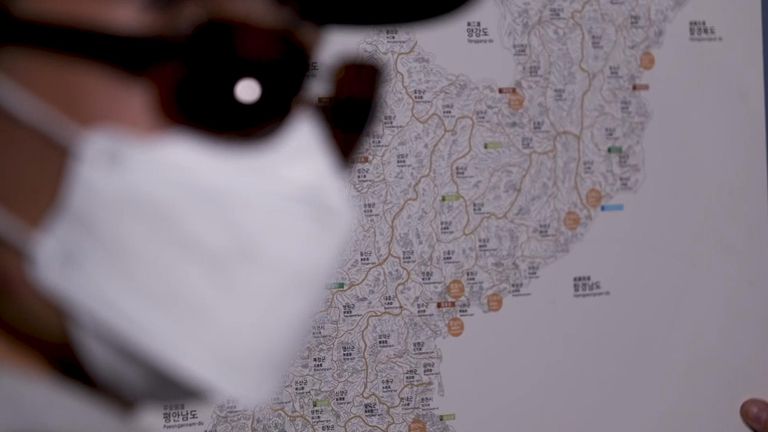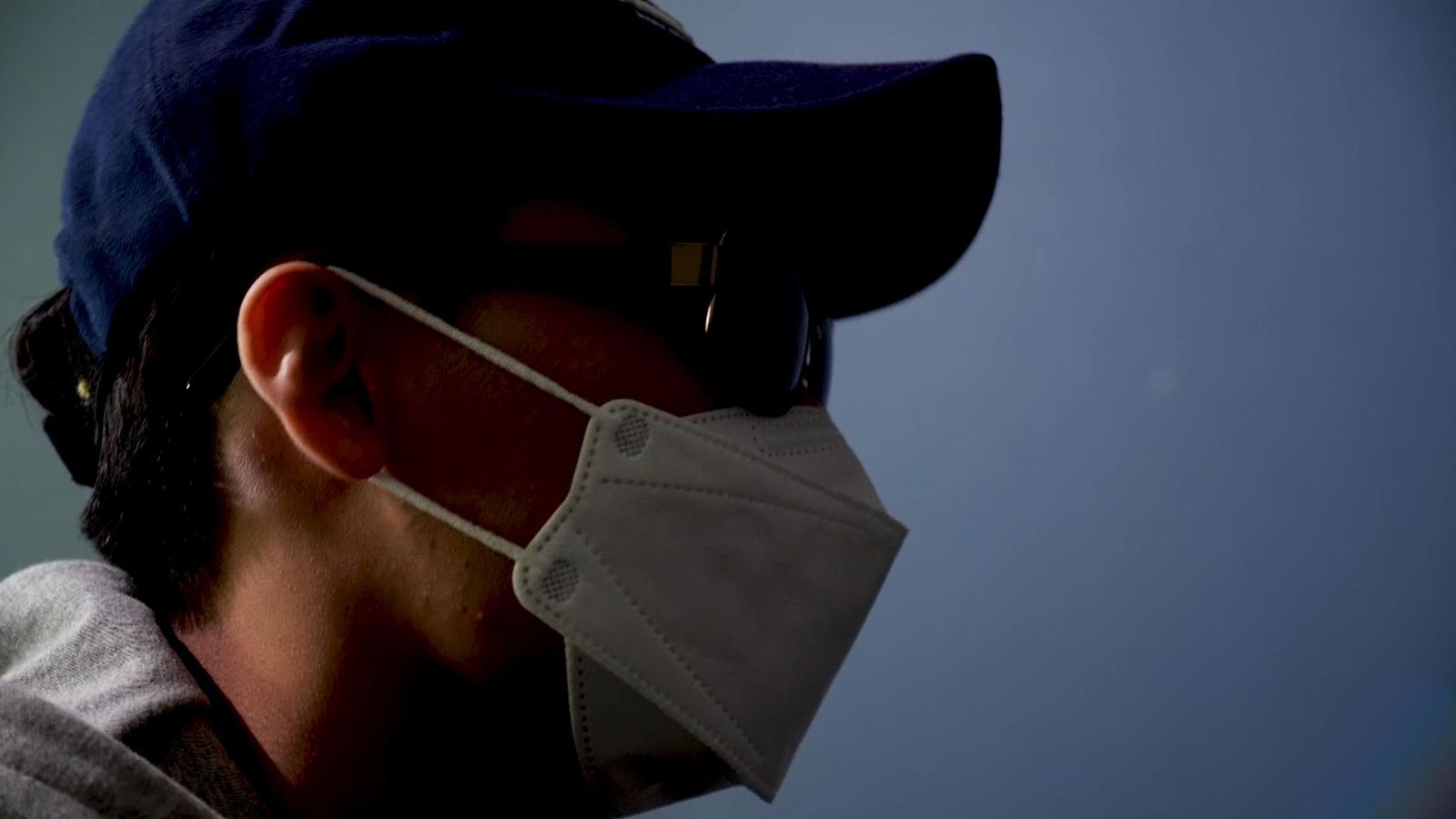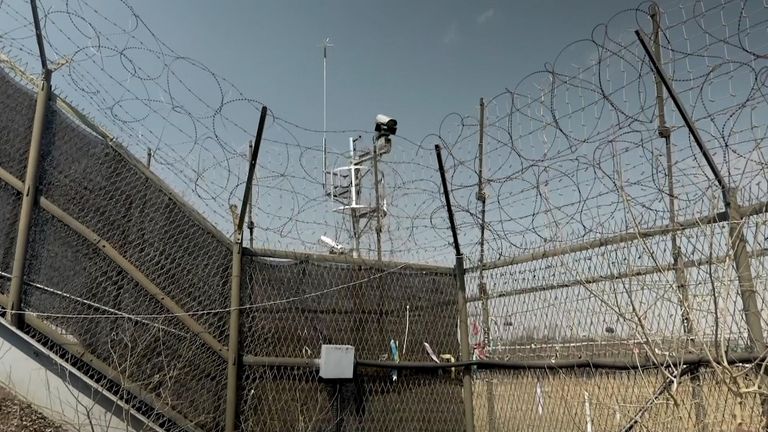
For David, the streets of Seoul are a much longed for safe haven.
To the casual observer, there is nothing out of the ordinary about him.
He is a slight man, softly spoken, dressed in baggy jeans and wide glasses that are fashionable in South Korea.
But his story and what he has been through to get here are utterly remarkable.
He is a North Korean defector, one of the very few to have escaped the DPRK (Democratic Republic of Korea) within the last few years.
“My mother bribed the soldier beforehand,” he tells me as he gestures on a map to where he crossed the border north into China.
“The river was frozen solid. I remember walking maybe 15 minutes to 20 minutes across the ice.
“I remember shivering after crossing the river and climbing over the fence that the Chinese guards had set up.”
For the safety of his relatives that remain in North Korea, we can’t tell you exactly when or exactly how he left. Any specific identifying detail could result in harsh punishments for his loved ones.
But his stories from inside are astonishing and offer a rare glimpse into what life has been like there since the pandemic struck.
Father disappeared without a trace
His childhood, it seems, was a relatively normal one in DPRK terms – helping from a young age to tend the fields and attending school when he could.
But everything changed shortly after his father suddenly disappeared without a trace.
“It wasn’t until about a year later when he got in touch with us that I realised he had fled to the south,” he explains.
“He contacted my mother via telephone. What we didn’t realise was that the North Korean state political security department had been tapping our landline. As a result, our mother was sent away to the labour camp.”
Initially, he was allowed to visit his mother every three months in detention, and he describes what he saw there as shocking.
“The amount of food provided in these detention centres is pitifully little,” he says.
“Prisoners receive around 20 to 30 kernels of corn each meal, which is obviously not enough for a person to survive on, so I packed a lunch when I went to visit her.”
“My mother’s body had shrunk to half her original size in the three months she had been in detention. My eyes filled with tears the moment I saw her; she was so dishevelled and gaunt that I didn’t recognise her initially.
“They also beat the women in prison. Mother’s eyes were swollen to bits and there were bruises everywhere. I wept when I saw her wounds.”
Mother tortured
David was just a child at this time but he was left to fend for himself and his siblings. He says he left school and tried to make ends meet, working in the fields and logging in the winter, but also stole food to survive.
He took what little he could to his mother.
“My mother said that if the inmates’ families didn’t visit them in prison, they would starve to death from malnutrition,” he explains.
“She said tens of people died every day from malnutrition. She even said that people would die in the middle of meals.
“To dispose of the corpses, she said they folded them at the waist and put them in sacks.
“Afterwards, the corpses were buried near the fences of the prison. Also, because the graves weren’t very deep, the stench of the corpses would come up from the ground in the spring when it became warmer.”
His mother described to him the torture she faced, being made to sit for up to 17 hours and beaten if they moved as much as a finger.
She also described how inmates whose families did not have the means to bring extra food or bribe the guards would have a life expectancy of just three to four years.
David’s stories matter because recent testimony from inside North Korea is very rare indeed.
The pandemic has made this already secretive state all but impenetrable.
Policy to shoot anyone trying to cross border
In the 2010s, around 1,000 people a year successfully defected from North Korea – the vast majority crossing the northern border with China before seeking asylum in a third country.
But a combination of the strict closed-border policy implemented by both China and the DPRK, plus a new policy to shoot anyone trying to cross, means that in 2022 that number had plummeted to just 67.
Read more:
Meet Kim Jong Un’s ‘precious’ child
Russia ‘wants to trade food for weapons with North Korea’
It means that not much is known about how the country fared amid the COVID-19 pandemic, but there is mounting evidence that it further strangled an already dysfunctional economy, bringing fresh waves of shortage and suffering.
“The borders were sealed off out of fear that the pandemic would come from outside North Korea. No one was allowed to go near the border,” says David.
“All the trade routes were effectively closed down. We depended heavily on smuggled goods from China in order to survive.
“I’ve heard from my relative that more people are starving, and prices are rising. They say it has become even more difficult to live.”
Click to subscribe to the Sky News Daily wherever you get your podcasts
Indeed, many think it’s likely people have died due to a lack of food in recent years.
“I’d say [it’s a] chronic economic crisis, not acute. It’s just an ongoing, bad situation economically,” says Chad O’Carroll, the founder of NK News.
What is the situation in North Korea now?
He and his team try to analyse what is going on in North Korea. Since the pandemic, their sources have become fewer and more nervous, but there is a lot of evidence all is not well.
“I definitely think some people would be in serious health problems due to the food shortages,” he says. He explains that there is evidence that the crisis is even biting the elites who live in the major cities.
“In Pyongyang and other major urban areas there has not been such significant shortages, but the diversification and nutritional value of the available food has significantly decreased,” he says.
“So if you have a chronic health problem, if you’re old, that could probably really push health conditions in a negative way.
“There’s been very large scale mobilisations of people from all walks of life to get into the farms to get their hands dirty and help.
“We’ve got some sources that say middle, even senior elites in some cases, are having to do their part and helping the nation tackle this food shortage situation.”
It is relatively unlikely that this latest crisis will cause major instability to the ruling Kim regime.
The propaganda machine has been in overdrive blaming the global pandemic and showing pictures of wide-scale deaths and hospitals in crisis elsewhere.
Indeed, the North Korean people are also no strangers to hardship.
Most agree the increased secrecy has been of real value to the DPRK’s security services and will thus likely remain.
But for a nuclear-armed power so increasingly assertive internationally, the reality of life inside is still largely shrouded in mystery.














